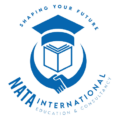Korean Classes
The Korean Language Proficiency Test (KLPT) is a standardized test that measures the language proficiency of non-native speakers in the Korean language. The test is administered by the National Institute for International Education (NIIED) in Korea and is recognized worldwide as a reliable assessment of Korean language proficiency.
The KLPT is divided into six levels, ranging from beginner to advanced, and covers various aspects of the language such as grammar, vocabulary, reading, writing, and listening. Many Korean language learners take the KLPT to demonstrate their proficiency in Korean and to advance their careers or educational opportunities in Korea.
At Nata Education, we offer KLPT preparation classes for individuals looking to enhance their Korean language skills and prepare for the test. Our experienced teachers provide personalized attention to each student and use various teaching methods to ensure that our students are well-prepared for the KLPT. Whether you are a beginner or an advanced learner, we have the resources and expertise to help you succeed in your Korean language journey.
What is the KLPT exam all about?

The Korean Language Proficiency Test, or KLPT, is an assessment exam designed to measure a non-native speaker’s proficiency in the Korean language. The exam consists of six levels, with Level 1 being the most basic and Level 6 being the most advanced.
The KLPT exam measures four main skills: reading, writing, listening, and speaking. The exam evaluates a candidate’s ability to understand and produce written and spoken Korean in various real-life situations.
The exam is administered by the Korean Language Education & Research Center, and passing the KLPT exam can be beneficial for individuals seeking employment or education opportunities in South Korea. The exam results are also helpful for employers who require their employees to have a certain level of proficiency in Korean.
How Will KOREAN Classes Benefit You?
earning the Korean language can also be a rewarding personal accomplishment. It can boost your confidence and self-esteem to be able to communicate in a new language, especially one as distinct and fascinating as Korean. Additionally, learning a new language has been shown to improve cognitive function and memory, providing long-term benefits beyond just language proficiency.
Attending Korean classes can also provide a social aspect, allowing you to meet new people and build connections with other students and teachers who share your interest in Korean language and culture. These connections can potentially lead to new friendships and opportunities to practice your language skills outside of the classroom.
Moreover, learning a new language requires dedication and discipline, and attending Korean classes can provide the structure and guidance needed to stay on track with your language learning goals. The classes can provide you with feedback and support to identify and improve areas where you may be struggling.
In conclusion, attending Korean classes can benefit you personally, academically, and professionally. It can help you gain a deeper understanding of Korean culture, expand your career opportunities, boost your cognitive function, and provide a sense of accomplishment and community.
How Does Korean Language Test Work?
The Korean language proficiency test, also known as TOPIK (Test of Proficiency in Korean), assesses a candidate’s proficiency in the Korean language. The test format consists of two main sections:
Section 1: Reading and Listening – This section assesses a candidate’s understanding of written and spoken Korean. It contains a total of 200 questions, divided into two sub-sections:
- Reading: 100 multiple-choice questions (duration: 70 minutes)
- Listening: 100 multiple-choice questions (duration: 50 minutes)
Section 2: Writing – This section assesses a candidate’s ability to express their thoughts in Korean. It contains a total of 4 tasks:
- Writing short sentences (duration: 15 minutes)
- Writing a letter or an email (duration: 30 minutes)
- Writing a short essay (duration: 60 minutes)
- Writing a long essay (duration: 90 minutes)
The test is divided into six levels, with level 1 being the beginner level and level 6 being the highest level of proficiency. The test is conducted twice a year, in April and October, at designated test centers worldwide.
Clearing the TOPIK test requires advanced preparation with professional help. If you want to know more about joining Korean language classes in Nepal, contact us today.
